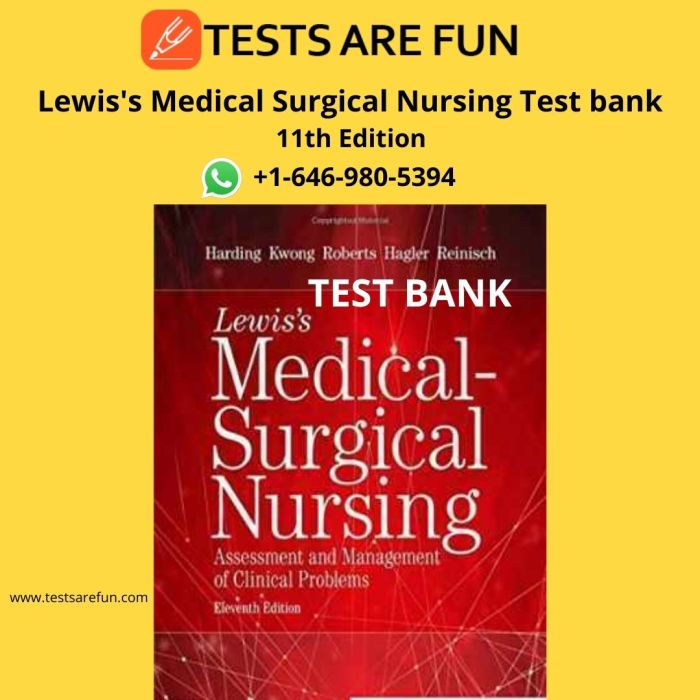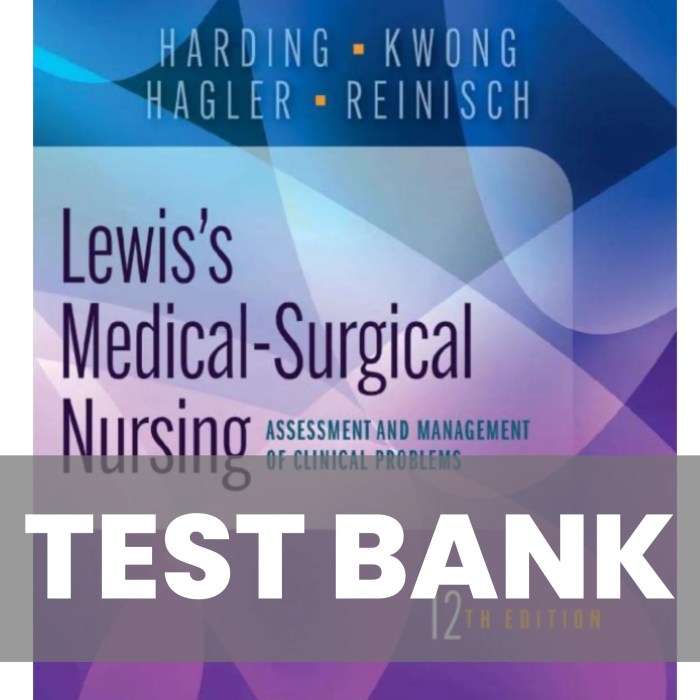Lewis Medical Surgical Test Bank is an indispensable resource for nursing students and practicing nurses seeking to enhance their knowledge and skills in medical-surgical nursing. This comprehensive test bank provides a thorough review of core concepts, assessment techniques, care planning strategies, and evaluation methods essential for providing optimal care to patients with medical-surgical conditions.
The content is meticulously organized into five sections, covering the fundamentals of medical-surgical nursing, assessment and diagnosis, planning and implementation of care, evaluation and outcomes, and professional issues. Each section delves into specific topics, providing detailed explanations, real-world examples, and practice questions to reinforce understanding.
Medical-Surgical Nursing Knowledge Base
Medical-surgical nursing is a specialized field of nursing that focuses on the care of patients with acute or chronic illnesses or injuries. These patients may be hospitalized or receiving care in an outpatient setting.
The core concepts of medical-surgical nursing include:
- Patient assessment and evaluation
- Medication administration
- Wound care
- Infection control
- Patient education
Medical-surgical nurses work closely with other members of the healthcare team, including physicians, physician assistants, and other nurses, to provide comprehensive care to their patients.
Common Medical-Surgical Conditions and Treatments
Common medical-surgical conditions include:
- Heart disease
- Cancer
- Stroke
- Diabetes
- Pneumonia
Treatments for these conditions vary depending on the severity of the condition and the patient’s overall health. Common treatments include:
- Medication
- Surgery
- Radiation therapy
- Chemotherapy
- Physical therapy
Role of the Nurse in Providing Care to Medical-Surgical Patients
The role of the nurse in providing care to medical-surgical patients is multifaceted. Nurses are responsible for:
- Assessing and monitoring patients’ conditions
- Administering medications and treatments
- Providing wound care
- Preventing and controlling infections
- Educating patients and their families about their conditions and treatments
- Providing emotional support to patients and their families
Medical-surgical nurses play a vital role in the care of patients with acute or chronic illnesses or injuries. They provide comprehensive care that helps patients recover from their illnesses and injuries and return to their normal lives.
Assessment and Diagnosis
The nursing assessment process is a systematic and comprehensive evaluation of a patient’s health status. It involves collecting data from a variety of sources, including the patient’s history, physical examination, and diagnostic tests. This data is then used to formulate nursing diagnoses, which are statements that describe the patient’s health problems and the factors that contribute to them.
The nursing assessment process begins with the collection of subjective data, which is information that the patient provides about their own health. This data can be collected through a variety of methods, including interviews, questionnaires, and physical examinations. Once subjective data has been collected, the nurse will then collect objective data, which is information that can be observed or measured.
This data can be collected through a variety of methods, including physical examinations, diagnostic tests, and laboratory tests.
Once both subjective and objective data have been collected, the nurse will then use this data to formulate nursing diagnoses. Nursing diagnoses are statements that describe the patient’s health problems and the factors that contribute to them. Nursing diagnoses are used to guide the development of a plan of care for the patient.
Use of Diagnostic Tests and Procedures in Medical-Surgical Nursing
Diagnostic tests and procedures are used in medical-surgical nursing to help diagnose and treat a variety of health conditions. These tests can be used to evaluate a patient’s overall health, to identify specific health problems, and to monitor the effectiveness of treatment.
Diagnostic tests and procedures can be invasive or non-invasive, and they can be performed in a variety of settings, including hospitals, clinics, and doctor’s offices.
Some of the most common diagnostic tests and procedures used in medical-surgical nursing include:
- Blood tests:Blood tests can be used to evaluate a patient’s overall health, to identify specific health problems, and to monitor the effectiveness of treatment. Blood tests can measure a variety of substances in the blood, including electrolytes, hormones, and proteins.
- Urine tests:Urine tests can be used to evaluate a patient’s kidney function, to identify specific health problems, and to monitor the effectiveness of treatment. Urine tests can measure a variety of substances in the urine, including glucose, protein, and bacteria.
- Imaging tests:Imaging tests can be used to create images of the body’s internal organs and structures. These tests can be used to identify a variety of health problems, including tumors, fractures, and infections. Imaging tests can include X-rays, CT scans, and MRIs.
- Biopsies:Biopsies involve the removal of a small sample of tissue from the body for examination under a microscope. Biopsies can be used to diagnose a variety of health problems, including cancer, infections, and autoimmune diseases.
Planning and Implementation of Care
Planning and implementing care for medical-surgical patients involves a systematic process that includes assessment, diagnosis, planning, implementation, and evaluation. This process is tailored to the individual needs of the patient and focuses on promoting optimal health outcomes.
The nursing care plan is a written document that Artikels the patient’s nursing diagnoses, goals, interventions, and evaluation criteria. It serves as a roadmap for providing individualized care and guides the nurse’s actions throughout the patient’s hospital stay.
Nursing Interventions for Common Medical-Surgical Conditions, Lewis medical surgical test bank
Common medical-surgical conditions encountered in nursing practice include:
- Cardiovascular conditions, such as heart failure, myocardial infarction, and arrhythmias
- Pulmonary conditions, such as pneumonia, chronic obstructive pulmonary disease (COPD), and asthma
- Gastrointestinal conditions, such as peptic ulcer disease, inflammatory bowel disease, and pancreatitis
- Musculoskeletal conditions, such as fractures, sprains, and arthritis
li>Genitourinary conditions, such as urinary tract infections, kidney stones, and prostate cancer
Nursing interventions for these conditions vary depending on the specific diagnosis and the patient’s individual needs. However, some common interventions include:
- Monitoring vital signs and assessing for complications
- Administering medications and providing treatments
- Educating patients about their condition and self-management strategies
- Providing emotional support and counseling
- Coordinating care with other healthcare professionals
Importance of Patient Education and Self-Management
Patient education and self-management are essential components of medical-surgical nursing. Empowering patients with knowledge about their condition and self-management skills promotes better health outcomes, reduces hospital readmissions, and improves quality of life.
Nurses play a vital role in providing patient education by:
- Explaining the patient’s condition and treatment plan
- Teaching patients about medications, diet, and lifestyle modifications
- Demonstrating self-care techniques, such as wound care or insulin administration
- Encouraging patients to ask questions and express concerns
- Providing written materials and resources for further learning
By fostering patient education and self-management, nurses can empower patients to take an active role in their own health and well-being.
Evaluation and Outcomes

Evaluating patient outcomes is a crucial aspect of medical-surgical nursing. It allows nurses to assess the effectiveness of their care, identify areas for improvement, and ensure that patients are receiving optimal care.
Nursing Evaluation Process
- Gather data:Collect information from various sources, including patient assessments, medical records, and interdisciplinary team members.
- Compare data to goals:Assess whether the patient’s current status aligns with the established goals of care.
- Identify discrepancies:Determine if there are any gaps between the patient’s current status and the desired outcomes.
- Analyze factors:Explore potential factors contributing to any discrepancies, such as patient adherence, medication side effects, or environmental barriers.
- Revise care plan:Modify the care plan as needed to address identified discrepancies and improve patient outcomes.
Use of Outcome Measures
Outcome measures are quantifiable indicators used to assess the effectiveness of nursing interventions. They provide objective data to evaluate patient progress and identify areas for improvement. Examples of outcome measures include:
- Patient satisfaction scores
- Length of hospital stay
- Readmission rates
- Infection rates
Examples of Positive and Negative Patient Outcomes
Positive outcomes:
- Patient achieves desired health outcomes, such as improved mobility, pain reduction, or disease management.
- Patient demonstrates increased knowledge and self-management skills.
- Patient experiences a positive hospital experience and expresses satisfaction with nursing care.
Negative outcomes:
- Patient fails to achieve desired health outcomes, such as persistent pain, impaired mobility, or disease progression.
- Patient experiences complications or adverse events related to treatment or care.
- Patient reports dissatisfaction with nursing care or hospital experience.
Professional Issues in Medical-Surgical Nursing: Lewis Medical Surgical Test Bank

Medical-surgical nursing encompasses ethical and legal considerations that shape the practice and responsibilities of nurses. Nurses must navigate these complexities to provide quality patient care while safeguarding their rights and well-being.
Ethical and Legal Issues
Ethical dilemmas in medical-surgical nursing often involve decisions regarding patient autonomy, informed consent, and end-of-life care. Nurses must respect patients’ rights to make informed choices about their treatment, ensuring they understand the risks and benefits involved. Legal issues, such as confidentiality, negligence, and malpractice, require nurses to adhere to established standards of care and maintain accurate documentation.
Patient Advocacy
Nurses play a crucial role in advocating for patients’ rights and ensuring their voices are heard. They serve as intermediaries between patients and healthcare providers, communicating patients’ concerns, needs, and preferences. By advocating for patients, nurses promote their well-being, protect their dignity, and empower them to participate actively in their healthcare decisions.
Challenges and Rewards
Working in medical-surgical nursing presents both challenges and rewards. Nurses often encounter complex medical conditions, requiring them to stay abreast of advancements in treatment and technology. The fast-paced and demanding environment can be physically and emotionally taxing. However, the opportunity to make a tangible difference in patients’ lives, provide compassionate care, and contribute to their recovery journey brings immense satisfaction and fulfillment.
Popular Questions
What is the purpose of Lewis Medical Surgical Test Bank?
Lewis Medical Surgical Test Bank provides a comprehensive review of core concepts, assessment techniques, care planning strategies, and evaluation methods essential for providing optimal care to patients with medical-surgical conditions.
How is the content organized?
The content is organized into five sections: fundamentals of medical-surgical nursing, assessment and diagnosis, planning and implementation of care, evaluation and outcomes, and professional issues.
Who can benefit from using Lewis Medical Surgical Test Bank?
Nursing students and practicing nurses seeking to enhance their knowledge and skills in medical-surgical nursing can benefit from using Lewis Medical Surgical Test Bank.